反义疑问句的用法归纳及习题知识交流
初中反义疑问句详解及练习和答案
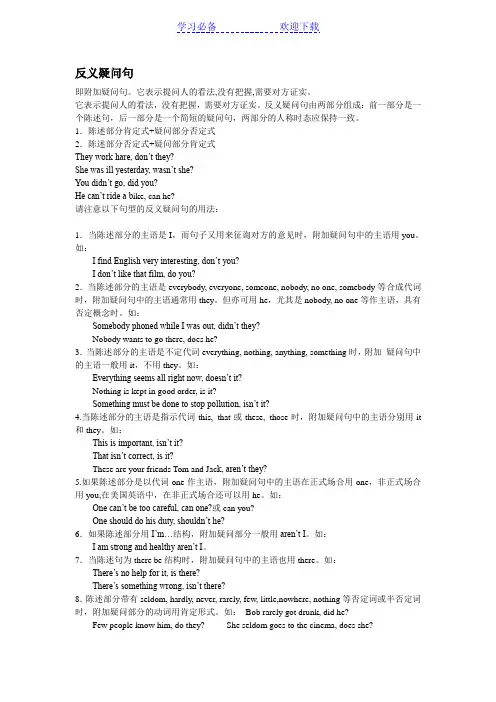
反义疑问句即附加疑问句。
它表示提问人的看法,没有把握,需要对方证实。
它表示提问人的看法,没有把握,需要对方证实。
反义疑问句由两部分组成:前一部分是一个陈述句,后一部分是一个简短的疑问句,两部分的人称时态应保持一致。
1.陈述部分肯定式+疑问部分否定式2.陈述部分否定式+疑问部分肯定式They work hare, don’t they?She was ill yesterday, wasn’t she?You didn’t go, did you?He can’t ride a b ike, can he?请注意以下句型的反义疑问句的用法:1.当陈述部分的主语是I,而句子又用来征询对方的意见时,附加疑问句中的主语用you。
如:I find English very interesting, don’t you?I don’t like that film, do you?2.当陈述部分的主语是everybody, everyone, someone, nobody, no one, somebody等合成代词时,附加疑问句中的主语通常用they。
但亦可用he,尤其是nobody, no one等作主语,具有否定概念时。
如:Somebody phoned while I was out, didn’t they?Nobody wants to go there, does he?3.当陈述部分的主语是不定代词everything, nothing, anything, something时,附加疑问句中的主语一般用it,不用they。
如:Everything seems all right now, doesn’t it?Nothing is kept in good order, is it?Something must be done to stop pollution, isn’t it?4.当陈述部分的主语是指示代词this, that或these, those时,附加疑问句中的主语分别用it 和they。
反义疑问句句知识点+习题
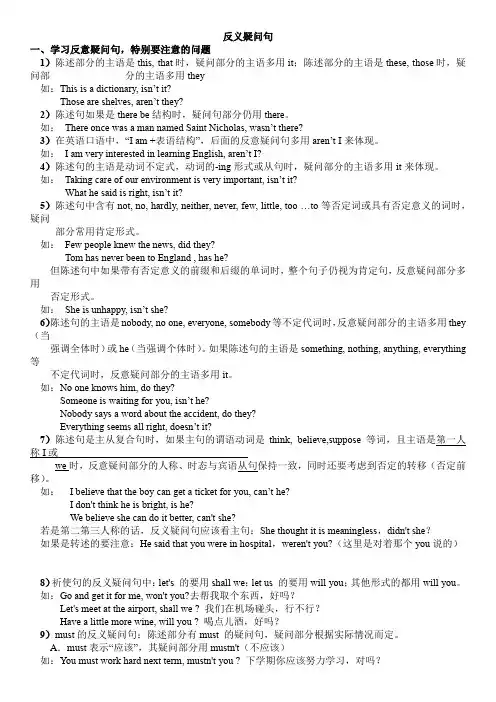
反义疑问句一、学习反意疑问句,特别要注意的问题1)陈述部分的主语是this, that时,疑问部分的主语多用it;陈述部分的主语是these, those时,疑问部分的主语多用they如:This is a dictionary, isn’t it?Those are shelves, aren’t they?2)陈述句如果是there be结构时,疑问句部分仍用there。
如:There once was a man named Saint Nicholas, wasn’t there?3)在英语口语中,“I am +表语结构”,后面的反意疑问句多用aren’t I来体现。
如:I am very interested in learning English, aren’t I?4)陈述句的主语是动词不定式,动词的-ing形式或从句时,疑问部分的主语多用it来体现。
如:Taking care of our environment is very important, isn’t it?What he said is right, isn’t it?5)陈述句中含有not, no, hardly, neither, never, few, little, too …to等否定词或具有否定意义的词时,疑问部分常用肯定形式。
如:Few people knew the news, did they?Tom has never been to England , has he?但陈述句中如果带有否定意义的前缀和后缀的单词时,整个句子仍视为肯定句,反意疑问部分多用否定形式。
如:She is unhappy, isn’t she?6)陈述句的主语是nobody, no one, everyone, somebody等不定代词时,反意疑问部分的主语多用they (当强调全体时)或he(当强调个体时)。
如果陈述句的主语是something, nothing, anything, everything 等不定代词时,反意疑问部分的主语多用it。
初中英语反义疑问句归纳与练习
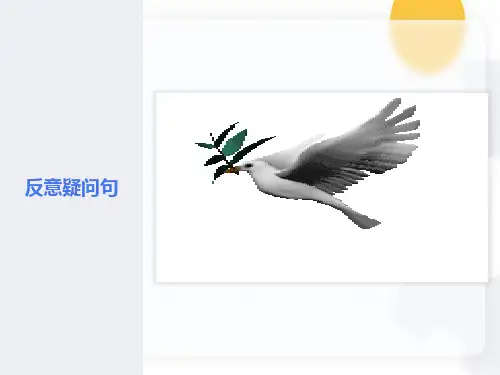
You'd like to go with me, wouldn't you?
带情态动词dare或need的反意疑问 句,疑问部分常用 need (dare ) + 主语。
We need not do it again, need we ?
4. 如果陈述部分用I’m…结构,附加疑问部分一般 用 aren’t I 如: I am strong and healthy, aren’t I?
5. 当陈述句为there be结构时,附加疑问句中的主 语也用there。如: There’s no help for it, is there? There’s something wrong, isn’t there?
you? 但若表推测这层含义时,不能用must,而要根 据陈述部分的不定式结构(即must之后的动 词)以及含义采用相应的动词形式。如: You must have made a mistake, haven’t you?
He must be in the library, isn’t he?
当陈述部分含有 had better时, 疑问部分用had.
5. 6.
Let us There
wdoertehfeejwobpseoouprlesetlhveerse, ,_____w__i__l_l__y___o__u__/__w__o?__n_’?t
you
7. You need to have a good dictiownaerrey,t_h_e_r_e_____?
如果陈述部分的否定词带有否定前缀,那么,该 陈述部分作肯定处理,附加疑问部分一般仍用否 定形式。如:
反义疑问句的用法归纳及习题
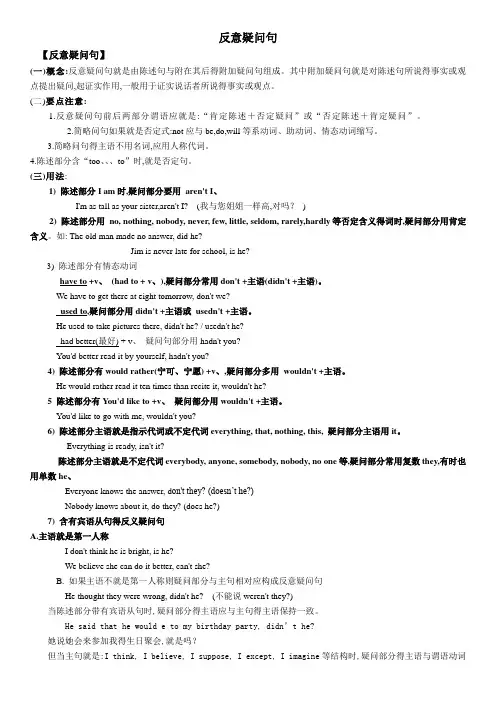
反意疑问句【反意疑问句】(一)概念:反意疑问句就是由陈述句与附在其后得附加疑问句组成。
其中附加疑问句就是对陈述句所说得事实或观点提出疑问,起证实作用,一般用于证实说话者所说得事实或观点。
(二)要点注意:1.反意疑问句前后两部分谓语应就是:“肯定陈述+否定疑问”或“否定陈述+肯定疑问”。
2.简略问句如果就是否定式:not应与be,do,will等系动词、助动词、情态动词缩写。
3.简略问句得主语不用名词,应用人称代词。
4.陈述部分含“too、、、to”时,就是否定句。
(三)用法:1) 陈述部分I am时,疑问部分要用aren't I、I'm as tall as your sister,aren't I?(我与您姐姐一样高,对吗?)2) 陈述部分用no, nothing, nobody, never, few, little, seldom, rarely,hardly等否定含义得词时,疑问部分用肯定含义。
如: The old man made no answer, did he?Jim is never late for school, is he?3) 陈述部分有情态动词have to +v、(had to + v、),疑问部分常用don't +主语(didn't +主语)。
We have to get there at eight tomorrow, don't we?used to,疑问部分用didn't +主语或usedn't +主语。
He used to take pictures there, didn't he? / usedn't he?had better(最好) + v、疑问句部分用hadn't you?You'd better read it by yourself, hadn't you?4) 陈述部分有would rather(宁可、宁愿) +v、,疑问部分多用wouldn't +主语。
反义疑问句的用法归纳及习题
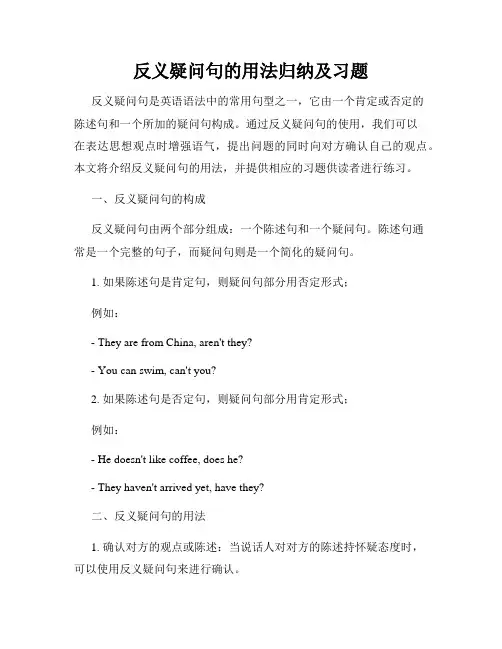
反义疑问句的用法归纳及习题反义疑问句是英语语法中的常用句型之一,它由一个肯定或否定的陈述句和一个所加的疑问句构成。
通过反义疑问句的使用,我们可以在表达思想观点时增强语气,提出问题的同时向对方确认自己的观点。
本文将介绍反义疑问句的用法,并提供相应的习题供读者进行练习。
一、反义疑问句的构成反义疑问句由两个部分组成:一个陈述句和一个疑问句。
陈述句通常是一个完整的句子,而疑问句则是一个简化的疑问句。
1. 如果陈述句是肯定句,则疑问句部分用否定形式;例如:- They are from China, aren't they?- You can swim, can't you?2. 如果陈述句是否定句,则疑问句部分用肯定形式;例如:- He doesn't like coffee, does he?- They haven't arrived yet, have they?二、反义疑问句的用法1. 确认对方的观点或陈述:当说话人对对方的陈述持怀疑态度时,可以使用反义疑问句来进行确认。
例如:- You haven't seen the movie, have you?- You don't like ice cream, do you?2. 请求对方的帮助或征求对方的意见:当说话人需要对方给予回应或意见时,可以使用反义疑问句来婉转地提出请求。
例如:- It's a beautiful day, isn't it? (期待对方赞同这个说法)- This problem is difficult, isn't it? (希望对方给予帮助或建议)3. 表达自己的观点或感受:反义疑问句也可以用来表达自己的观点或感受,并期待对方与自己保持一致或不一致。
例如:- She is a talented singer, isn't she?- You're not feeling well, are you?三、习题练习以下是一些习题,供读者练习反义疑问句的用法。
初中反义疑问句详解及练习和答案
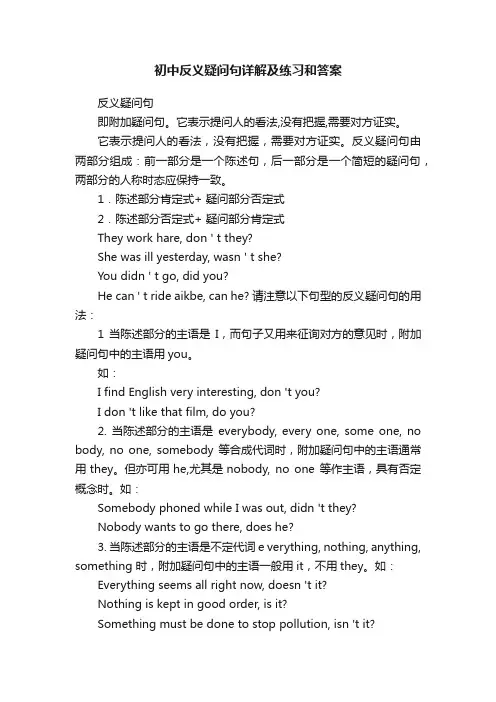
初中反义疑问句详解及练习和答案反义疑问句即附加疑问句。
它表示提问人的看法,没有把握,需要对方证实。
它表示提问人的看法,没有把握,需要对方证实。
反义疑问句由两部分组成:前一部分是一个陈述句,后一部分是一个简短的疑问句,两部分的人称时态应保持一致。
1.陈述部分肯定式+ 疑问部分否定式2.陈述部分否定式+ 疑问部分肯定式They work hare, don ' t they?She was ill yesterday, wasn ' t she?You didn ' t go, did you?He can ' t ride aikbe, can he? 请注意以下句型的反义疑问句的用法:1当陈述部分的主语是I,而句子又用来征询对方的意见时,附加疑问句中的主语用you。
如:I find English very interesting, don 't you?I don 't like that film, do you?2. 当陈述部分的主语是everybody, every one, some one, no body, no one, somebody 等合成代词时,附加疑问句中的主语通常用they。
但亦可用he,尤其是nobody, no one 等作主语,具有否定概念时。
如:Somebody phoned while I was out, didn 't they?Nobody wants to go there, does he?3. 当陈述部分的主语是不定代词e verything, nothing, anything, something 时,附加疑问句中的主语一般用it,不用they。
如:Everything seems all right now, doesn 't it?Nothing is kept in good order, is it?Something must be done to stop pollution, isn 't it?4. 当陈述部分的主语是指示代词this, that 或these, those 时,附加疑问句中的主语分别用it和they。
(完整版)初中英语反义疑问句讲解_练习及答案
反义疑问句(一)见解:反意疑问句是由陈述句和附在以后的附加疑问句组成。
其中附加疑问句是对陈述句所说的事实或见解提出疑问,起证明作用,一般用于证明说话者所说的事实或见解。
(二)要点注意:1、反意疑问句前后两部分谓语应是:“必定陈述+否定疑问”或“否定陈述+必定疑问”。
2、简单问句若是可否定式:not 应与 be, do, will 等系动词、助动词、神情动词缩写。
3、简单问句的主语不用名词,应用人称代词。
4、陈述部分含“ too...to时,”可否定句。
(三)用法:1) 陈述部分I am 时,疑问部分要用aren't I.I'm as tall as your sister , aren't I?(我和你姐姐相同高,对吗?)2) 陈述部分用 no, nothing, nobody, never, few, little, seldom, hardly 等否定含义的词时,疑问部分用必定含义。
如: The old man made no answer, did he?Jim is never late for school, is he?3) 陈述部分有have to +v. (had to + v.) ,疑问部分常用don't +主语( didn't + 主语)。
We have to get there at eight tomorrow, don't we?4) 陈述部分的谓语是used to 时,疑问部分用didn't + 主语或usedn't +主语。
He used to take pictures there, didn't he? / usedn't he?5)陈述部分有 had better(最好) + v. 疑问句部分用 hadn't you? You'dbetter read it by yourself, hadn't you?6) 陈述部分有would rather (宁愿、宁愿)+v. ,疑问部分多用wouldn't + 主语。
反义疑问句的用法和回答
反义疑问句的用法和回答
1. 嘿,你知道吗,反义疑问句可以用来确认信息呢!就像“你喜欢吃苹果,不是吗?”。
这多直接呀,一下就知道对方到底喜不喜欢苹果啦!
2. 哇塞,反义疑问句还能加强语气呢!比如说“这电影超好看,对吧?”,这样说不就感觉更强烈了嘛!
3. 哎呀,当你不确定对方想法的时候,反义疑问句就派上用场啦!像“今天天气不错,是吧?”,多轻松地就引出对方的看法了呀!
4. 嘿哟,反义疑问句有时候还能表示惊讶呢!你看“你居然会做这道菜,不是吧?”,是不是很有意思呀!
5. 哇哦,在聊天中时不时来个反义疑问句,那可太有趣啦!比如“你不会还没去过那个地方吧?”,一下子就勾起别人的话题啦!
6. 咦,反义疑问句能让对话变得更自然流畅呢!像“我们去逛街吧,好不好?”,多亲切呀!
7. 哈哈,用反义疑问句来表达自己的想法也很不错哦!比如说“我这件衣服好看,对吧?”,多么自信呀!
8. 哟呵,反义疑问句还能让交流更有互动性呢!就像“你见过那个明星,对吧?”,大家就可以一起讨论啦!
9. 厉害吧,学会用反义疑问句真的很有用呢!不管是聊天还是确认事情,都超好用!就像“你明天会来,对吧?”。
反正我觉得反义疑问句真的是太好用啦!。
(完整版)反义疑问句用法归纳
反意疑问句用法完全归纳一、基本用法与结构反意疑问句由“陈述句+简略疑问句”两部分组成,第一部分提出一种看法,第二部分用来质疑或表示证实。
陈述部分与疑问部分的动词时态和动词性质应保持一致,而且肯定和否定形式彼此相反,即陈述部分为肯定式时,疑问部分用否定式,陈述部分为否定式时,疑问部分用肯定式:He likes English, doesn’t he? 他喜欢英语,是吗?He doesn’t like English, does he? 他不喜欢英语,是吗?【注】1. 若陈述部分含有seldom, hardly, never, few, nothing等否定词或半否定词,其疑问部分要用肯式:He has few friends here, has he? 他在这儿几乎没什么朋友,是吗?She said nothing, did she? 她什么也没说,是不是?2. 若陈述部分含有带否定前缀的词,疑问部分仍用否定式:It is unfair, isn’t it? 这不公平,不是吗?It is impossible, isn’t it? 那是不可能的,是吗?二、反意疑问句的主语问题1. 基本原则:疑问部分的主语应与陈述部分主语一致,且只能是代词:Mary is a nurse, isn’t she? 玛丽是护士,对吗?2. 当陈述部分为there be句型时,疑问部分仍用there作“主语”:There was nothing in the room, was there? 房间里什么也没有,是吗?3. 当陈述部分的主语是指示代词时,疑问部分用it, they等代词:That is a new car, isn’t it? 这是一辆新汽车,是吗?4. 当陈述部分的主语是复合不定代词时,若陈述部分的主语为somebody, someone, everyone, everybody, no one, nobody等复合不定代词,其反意疑问句的主语在正式文体中用he,在口语或非正式文体中通常用they:Nobody was late, were they? 没有一个人迟到,是吗?5.当陈述部分的主语是 something, anything, nothing, everything等复合不定代词时,其反意疑问句的主语要用it:Everything is ready, isn’t it? 一切都准备好了吗?Nothing is important, is it? 没有什么重要的,不是吗?三、陈述部分有动词have的反意疑问句1. 当have 为助动词时,其反意疑问句沿用同样的助动词:He has already left, hasn’t he? 他已经离开了,是吗?2. 当 have 为实意动词时,要分两种情况:①若表示“所有”,反意疑问句可以用have,也可以用do:He has a lot of friends here, hasn’t [doesn’t] he? 他在这儿有许多朋友,是吗?但是若陈述部分用的是have的否定式,反意疑问句用have 还是用do,取决于陈述部分的动词形式:He hasn’t any money, has he? 他没有钱,是吗?He doesn’t have any money, does he? 他没有钱,是吗?②若表示“吃”、“玩”等意思,反意疑问句要用do:He has supper at 5, doesn’t he? 他5点吃晚餐,是吗?He had a good time at the party, didn’t he? 他在晚会上玩得很开心,是吗?3. 当用于have to时,通常也有两种可能:若表示经常性的行为,则多用加助动词do的形式;若表示特定的行为,则多用have:He often has to get up early, doesn’t he? 他经常要早起,是吗?He has to go to bed late tonight, hasn’t he? 他今晚要迟睡,是吗?四、含情态动词的反意疑问句1. 基本原则:在通常情况下,当陈述部分含有情态动词时,疑问部分会重复前面同样的情态动词:He can speak English, can’t he?他会说英语,是吗?We shouldn’t go, should we? 我们不应该去,对不对?2. 当陈述部分含有must时,要分两种情况:①若must表示“必须”或“有必要”,疑问部分用mustn’t或needn’t:You must leave at once, mustn’t [needn’t] you? 你必须(有必要)马上离开,是吗?但是若陈述部分有mustn’t表示禁止,疑问部分要must:You mustn’t laugh, must you? 你不准笑,知道吗?②若must表示推测,疑问部分不能用must,而应根据must后的动词结构采用相应的动词形式:He must be tired, isn’t he? 他一定累了,是吗?五、陈述部分为祈使句的反意疑问句1. 基本原则:若陈述部分为祈使句,疑问部分通常用will you:Please help us, will you? 请帮帮我们,好吗?Come with us, will you? 同我们一起去,好吗?Don’t forget to post the letter, will you? 请别忘了寄信。
英语中反义疑问句的用法归纳
英语中反义疑问句的用法归纳反义疑问句用法归纳一、基本概念反义疑问句由两部分组成:前一部分是一个陈述句,后一部分是一个简短的疑问句,两部分的人称和时态应保持一致。
二、基本用法1. 肯定陈述句 + 否定疑问句例如:You like music, don't you? (你喜欢音乐,不是吗?)2. 否定陈述句 + 肯定疑问句例如:He doesn't like sports, does he? (他不喜欢运动,是吗?)3. 祈使句 + 反义疑问句(1)Let's 开头的祈使句,用 shall we?例如:Let's go for a walk, shall we? (我们去散步,好吗?)(2)Let us 开头的祈使句,用 will you?例如:Let us have a rest, will you? (让我们休息一下,好吗?)(3)其他祈使句,用 will you?例如:Open the door, will you? (打开门,好吗?)4. 含有 must 的反义疑问句(1)must 表示“必须”时,用 needn't例如:You must finish your homework today, needn't you? (你今天必须完成作业,不是吗?)(2)must 表示推测“一定,肯定”时,根据实际情况而定例如:He must be very tired, isn't he? (他一定很累了,不是吗?)5. 含有否定词的反义疑问句当陈述句中有 never, few, little, nothing, nobody 等否定词时,反义疑问句用肯定形式。
例如:There is nothing in the box, is there? (盒子里什么都没有,是吗?)三、固定搭配1. “I am + 表语”,反义疑问句用“aren't I”例如:I'm late, aren't I? (我迟到了,不是吗?)2. 陈述部分是“there be”结构,反义疑问句用“be there”例如:There is a book on the desk, isn't there? (桌子上有一本书,不是吗?)3. 当陈述部分主语是不定代词 everyone, somebody, nobody, everyone 等时,反义疑问句用 they 或 he例如:Everyone is here, aren't they? (大家都在这儿,不是吗?)4. 当陈述部分主语是 this, that 时,反义疑问句用 it;当陈述部分主语是 these, those 时,反义疑问句用 they例如:This is a pen, isn't it? (这是一支钢笔,不是吗?)5. 当陈述部分是主从复合句时,反义疑问句与主句的主语和谓语保持一致例如:He said he would come, didn't he? (他说他会来,不是吗?)双语例句:1. I have a lot of friends, don't I? (我有很多朋友,不是吗?)2. She doesn't speak French, does she? (她不会说法语,是吗?)3. Have a cup of coffee, will you? (喝杯咖啡,好吗?)4. We should study hard, shouldn't we? (我们应该努力学习,不是吗?)5. They have been to Beijing, haven't they? (他们去过北京,不是吗?)6. You aren't a doctor, are you? (你不是医生,对吧?)7. There are some apples on the tree, aren't there? (树上有一些苹果,不是吗?)8. Nobody knows the answer, do they? (没人知道答案,对吧?)9. This isn't your book, is it? (这不是你的书,对吧?)10. Those are beautiful flowers, aren't they? (那些是漂亮的花,不是吗?)11. He can swim very well, can't he? (他游泳游得很好,不是吗?)12. She never tells lies, does she? (她从不说谎,对吧?)13. We had a great time yesterday, didn't we? (我们昨天玩得很开心,不是吗?)14. If it rains tomorrow, we won't go hiking, will we? (如果明天下雨,我们就不去徒步了,对吧?)15. You think he is right, don't you? (你认为他是对的,不是吗?)16. Mary has few friends here, does she? (玛丽在这儿几乎没朋友,对吧?)17. The boy doesn't like vegetables, does he? (这男孩不喜欢蔬菜,是吗?)18. Everyone wants to be happy, don't they? (每个人都想快乐,不是吗?)19. I'm a good student, aren't I? (我是个好学生,不是吗?)20. He told you the truth, didn't he? (他告诉你真相了,不是吗?)。
- 1、下载文档前请自行甄别文档内容的完整性,平台不提供额外的编辑、内容补充、找答案等附加服务。
- 2、"仅部分预览"的文档,不可在线预览部分如存在完整性等问题,可反馈申请退款(可完整预览的文档不适用该条件!)。
- 3、如文档侵犯您的权益,请联系客服反馈,我们会尽快为您处理(人工客服工作时间:9:00-18:30)。
反意疑问句【反意疑问句】(一)概念:反意疑问句是由陈述句和附在其后的附加疑问句组成。
其中附加疑问句是对陈述句所说的事实或观点提出疑问,起证实作用,一般用于证实说话者所说的事实或观点。
(二)要点注意:1、反意疑问句前后两部分谓语应是:“肯定陈述+否定疑问”或“否定陈述+肯定疑问”。
2、简略问句如果是否定式:not应与be,do,will等系动词、助动词、情态动词缩写。
3、简略问句的主语不用名词,应用人称代词。
4、陈述部分含“too...to”时,是否定句。
(三)用法:1) 陈述部分I am时,疑问部分要用aren't I.I'm as tall as your sister,aren't I?(我和你姐姐一样高,对吗?)2) 陈述部分用no, nothing, nobody, never, few, little, seldom, rarely,hardly等否定含义的词时,疑问部分用肯定含义。
如:The old man made no answer, did he?Jim is never late for school, is he?3) 陈述部分有情态动词have to +v. (had to + v.),疑问部分常用don't +主语(didn't +主语)。
We have to get there at eight tomorrow, don't we?used to,疑问部分用didn't +主语或usedn't +主语。
He used to take pictures there, didn't he? / usedn't he?had better(最好)+ v. 疑问句部分用hadn't you?You'd better read it by yourself, hadn't you?4) 陈述部分有would rather(宁可、宁愿)+v.,疑问部分多用wouldn't +主语。
He would rather read it ten times than recite it, wouldn't he?5 陈述部分有You'd like to +v. 疑问部分用wouldn't +主语。
You'd like to go with me, wouldn't you?6) 陈述部分主语是指示代词或不定代词everything, that, nothing, this, 疑问部分主语用it。
Everything is ready, isn't it?陈述部分主语是不定代词everybody, anyone, somebody, nobody, no one等,疑问部分常用复数they,有时也用单数he.Everyone knows the answer, don't they? (doesn’t he?)Nobody knows about it, do they? (does he?)7) 含有宾语从句的反义疑问句A.主语是第一人称I don't think he is bright, is he?We believe she can do it better, can't she?B. 如果主语不是第一人称则疑问部分与主句相对应构成反意疑问句He thought they were wrong, didn't he? (不能说weren't they?)当陈述部分带有宾语从句时,疑问部分的主语应与主句的主语保持一致。
He said that he would come to my birthday party, didn’t he?他说他会来参加我的生日聚会,是吗?但当主句是:I think, I believe, I suppose, I except, I imagine等结构时,疑问部分的主语和谓语动词应与宾语从句的主语和谓语保持一致。
I don’t believe he will succeed, will he? 我不相信他会成功,是吗?He doesn’t believe he will succeed, does he? 他不相信他会成功,是吗?8) 省去主语的祈使句的反意疑问句,Don't do that again, will you?Go with me, will you / won't you?否定祈使句+ will you?肯定祈使句+ will / won’t you?Let's 开头的祈使句,后用shall we(或用shan't we) ?而Let us 开头的祈使句,后用will you(或won't you)?Let's go and listen to the music, shall we(或用shan't we)?Let us wait for you in the reading-room, will you (或won't you)?9) 陈述部分是"there be"结构的,疑问部分用there。
There is something wrong with your watch, isn't there?There will not be any trouble, will there?11)如果陈述句部分的谓语含有带否定前缀dis-, un-, im-或否定后缀-less的词(dislike, discourage,be unfair/ untrue/ unable, etc.),仍按肯定句处理,其反问部分一般用否定式。
It’s unfair, isn’t it? 不公平,是吗?You dislike it, don’t you? 你不喜欢它,是吗?The patient is unable to move round, isn’t he? 这个病人不能到处走,是吗?10、陈述部分含有must的反义疑问句:当must作“必须”讲时,其翻译疑问部分用needn’t;当含有mustn’t(不允许,禁止)时,其反意疑问部分用must/ may。
You must go now, needn’t you? 你必须走,是吗?You mustn’t smoke here, must/may you? 你不可以在这里吸烟,对吗?11、感叹句中,疑问部分用be +主语。
What beautiful flowers, aren’t they? 多漂亮的花呀,不是吗?16、带情态动词dare或need的反义疑问句,疑问部分常用 need (dare ) +主语。
We need not do it again, need we? 我们不需要重做,是吗?He dare not say so, dare he? 他不敢如此说,是吗?当dare, need 为实义动词时,疑问部分用助动词do + 主语。
例如:She doesn’t dare to go home alone, does she? 她不敢独自回家,是吗?四、反义疑问句的回答:1、一个句子前后保持一致,要么肯定到底,要么否定到底,不能出现Yes, I don’t和No, I do 的形式。
You don’t go to school on Sunday, do you? 肯定回答:Yes, I do.否定回答:No, I don’t.2、反义疑问句的回答是根据实际情况来回答的。
不用看汉语如何翻译,只看所提到的事情是否发生。
如果发生了,就用肯定回答,否则用否定回答。
()1. Don’t forget to give Polly some food and change her water, _______?A. shall weB. will youC. won’t youD. do you()2. There is little juice in the glass, _________?A. is thereB. isn’t thereC. is it()3. ---He’s seldom late for school, ___________?---No. He is used to going to school early.A. isn’t heB. has heC. hasn’t heD. is he()4.---This bus is always late, _________? ---Sure, it is.A. is not itB. isn’t itC. isn’t the busD. doesn’t it()5.---You’re new here, ________?----Yes, I’m from Dujiangyan. I came here last week.A. do youB. don’t youC. are youD. aren’t yo u()6. You used to be outgoing, ?A. do youB. don’t youC. didn’t youD. did you()7. He has never watched such an important match , _____ he?A. hasn'tB. hasC. isD. isn't()8.They have to work at once,______ they?A. haveB. haven'tC. doD. don't()9. She often feels tired,______ she?A. doesn'tB. doesC. isD. isn't()10. Let's take a short rest, ______?A. do weB. aren't weC. will youD. shall we()11. Hundreds of people lost their lives in the accident,_______ they?A. don'tB. didn'tC. doD. did()12. ---Lily didn't come to school, did she?---____. She was ill in bed.A. No, she didB. Yes, she did.C. No, she didn't.D. Yes, she didn't()13.---She isn't a teacher, is she?---_____. She works in a hospital.A. No, she isB. Yes, she is.C. No, she isn't.D. Yes, she isn't()14.Lily looks like Lucy,_______?A. is LilyB. isn't sheC. does LillyD. doesn't she()15.Tom often has lunch at school,_____?A. doesn't TomB. doesn't heC. does TomD. doesn't he()1.He hardly hurt himself in the accident___________?A. doesn’t heB. didn’t heC. did heD. does he()2. Let’s search the Internet for some information about famous people,______?A. will youB. won’t youC. shall we()3.Eric’s never seen a three-D movie at the cinema,_______?A.hasn’t he B.has he C.isn’t he D.is he()4.---He didn’t go to the lecture this morning, did he?----______. Though he was not feeling very well.A. No, he didn’t.B. Yes, he did.C. No, he did.D. Yes, he didn’t.()5.—He’s already back to Australia, _________?— _________. He is on a visit to Shanghai.A. isn’t he; NoB. hasn’t he; YesC. isn’t he; YesD. hasn’t he; No()6.—She doesn’t like geography,does she?— ___________ .A. Yes,she doesB. Yes,she doesn’tC. No,she does()7. He’s flown to Hainan for a holiday, _______ he?A. isn’tB. hasn’tC. wasn’t()8. ---- Let’s go skating,_______?---- OK. Let’s go.A. do youB. don’t youC. will youD. shall we()9. ---There is little milk in the milk bag, ________ there? ---OK. I’ll get you a new bag.A. isB. isn’tC. aren’tD. are()10. Bob, you watched the fashion show last night, ________?A. weren’t youB. didn’t youC.haven’t youD. won’t you()11. ---Are you going to the picnic with us tonight?---Yes. ---You won’t be late, ________?()12. There is no important information in the newspaper, _______?A. isn’t thereB. is itC. is there()13. There are two libraries in this city, _______?A. aren’t thereB. aren’t theyC. are two()14. Mom, my grandfather goes for a walk after supper every day, _______?A. does heB. is heC. doesn’t heD. isn’t he()15. Liu Qian has made “magic” a hot word, _______ he?A. doesn’tB. didn’tC. hasn’tD. isn’t()16.---You aren’t a professional athlete, are you?---______. I am just a football fan.A. Yes, I amB. No, I’m notC. Of courseD. Sometimes()17. ---Millions of people know about Susan Boyle now, _______?----_______, she becomes well-known because of her success on Britain’s Got Talent.A. do they; NoB. do they; YesC. don’t they; NoD. don’t th ey; Yes()18. He’s fed the dog and the cat, _______?A. doesn’t heB. isn’t heC. wasn’t heD. hasn’t he()19. John, clean your room, _______?A. will youB. shall weC. don’t youD. doesn’t he()20. I don’t think she has gone to Beijing, _______?A. has sheB. hasn’t sheC. do ID. don’t I一、完成下列反意疑问句, 每空一词。
